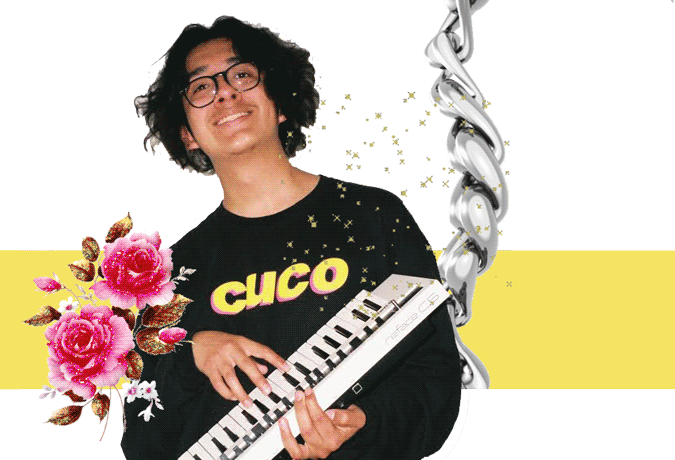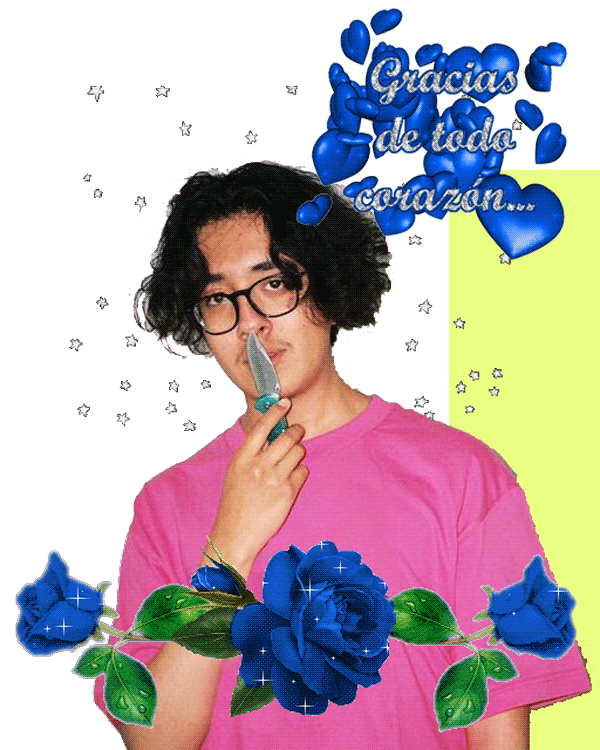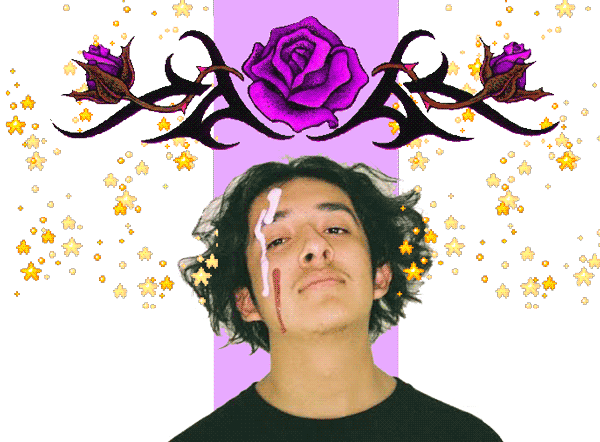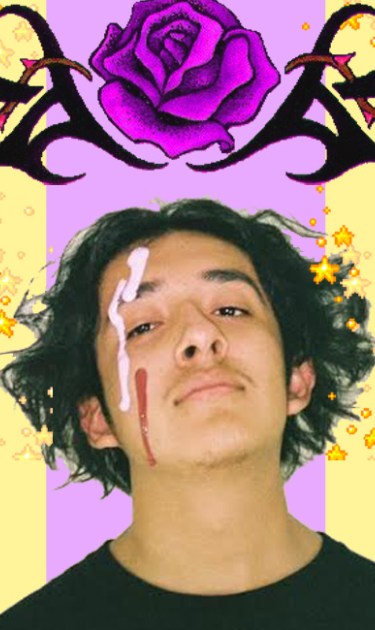Omar Banos, better known as Cuco, has made it a habit to hug, talk to, and take pictures with every last one of his fans at his backyard shows. It’s mid-February in Los Angeles, where youth of color are currently facing a fight on multiple fronts; not only does the current administration target their community, as it is one of the biggest sanctuary cities in the U.S., but the neighborhoods are under attack by a fast wave of violent gentrification. It’s no surprise that some seek aggressive outlets for their anger. But Cuco’s music paints an alternative response: one of young love and heartache under Los Angeles’ pink skies.
The 18-year-old Chicano’s two EPs, Songs4u and Wannabewithu, are dreamy compilations of cosmic love from someone seemingly untainted by the toxic machismo that often plagues Chicanxs. Cuco’s music recalls lowrider classics like Ritchie Valens’ “Donna,” at the same time evincing Tame Impala’s psychedelic daydreaming. Cuco’s two EPs reject rigid genre boundaries, as mariachi trumpets blaze over 808s and reverbed vocals evoke Morrissey’s weary romance. Cuco’s tracks are sometimes sung in English, sometimes in Spanish, sometimes in Spanglish – but they’re always tinged with a touch of humor and tenderness.

“I’m super soft,” Cuco says about his lyrics. “Because my music is super soft, it challenges a lot of our Chicano elders, ‘cause they’re always like, ‘somos hombres, no debemos de llorar,’ pero I do cry.” On songs like “Cupid’s Quiver,” Cuco reimagines old school boleros that have become Chicano staples, replacing guitar strings with celestial synths. Cuco’s vocals echo and break as he shamelessly begs an ex-lover to take him back. “I’m at your front door/But I’m dead can’t knock now, dear/Will you still open/To say bye/I miss you.” The lyrics are marked by naked despair, but they’re sung with melancholy that reflects a millennial ennui, which lends to Cuco’s “super softness.” Where forbears like Los Dandys vigorously belt out their sorrow, Cuco mumbles harmoniously, creating tenderness that grounds his maudlin lyrics without losing any of their vulnerability.
“These are scary times to make art, but I use my fear as inspiration.”
That candor extends beyond his confessions of love and loss. The title of Songs4u‘s “Rest Easy, I’ll See You Again” promises hope, yet it delivers somber, doubtful lyrics, wherein the only definitive statements are “I’ll never/see you again/I hope that I can catch up to you/I’m kneeling.” Like in “Cupid’s Quiver,” the artist finds himself begging someone for another chance. Yet, the series of questions double as Cuco’s inner dialogue, one that suggests doubts about his career. He sings, “Did you say/the things you wanted to say?/ Or did you sell/and it just went away?” It’s here that we see a young artist at the brink of a major breakthrough contemplate what being a creator means.
“These are scary times to make art,” Cuco says of the current political climate. “But I use my fear as inspiration. I’m scared; I have family that doesn’t have papers yet…but I feel like it just means that there’s more of a reason to strive higher, to rise. They don’t want my people to rise? So I’m gonna rise. I don’t care that we have a loco in the Casa Blanca, I don’t care, I want to make sure that I shine and show people that they can do the same.”
Under Trump, there’s been much debate about the overpoliticization of art that isn’t inherently political. But the line between projecting one’s politics onto art and the innately political nature of artistic production is blurred when artists accept alternative interpretations of their work because it aligns with their own praxis. Such is the case with Cuco, who accepts his fans’ characterization of “Rest Easy, I’ll See You Again” as a commentary on deportation. “You never know if you’re gonna see somebody who gets deported again. My dad didn’t get to see his family for about 20 years and then he was stuck in Mexico for about seven months in 2015 because of problems with his papers. So my mother and I were stuck in this uncertainty that many first-generation, second-generation kids experience…we literally couldn’t ‘rest easy.’ So I get how people read the song that way.”
“I’m blooming and I want others to bloom.”
With LA barrios consistently enduring systemic violence, Cuco’s ability to string together threads of romance and hope is refreshing. But, according to him, this beauty is built in the very fiber of the city. “LA living expenses are going up and it’s hard; it’s getting to that point [where] people shouldn’t be living like this. People are losing hope. But even in the slums of LA, there’s art. Our city manages to shine even when it’s down.” Banos has sketched a colorful image of the City of Angels, which shapes the way in which his music plays with the urban landscape. His songs map out a lover’s journey through LA. Tracks like “Stay for a Bit” and “Lava Lamp” define the city as an instigator, caretaker, and promisor of young love.

In “Lava Lamp,” LA soothes Cuco’s inner turmoil: “Yesterday in LA/It was sunny but it rained/In my room (in my room)/When I wrote a song for/Someone’s out there/waiting for me.” LA becomes the city of hope for Cuco, where better days are promised and a lover awaits him outside his door. On “Stay for A Bit,” Los Angeles morphs into a guide for Cuco and simple light pollution becomes a path to young love: “City lights ignite the path to you.” Simultaneously, the Los Angeles streets, often perceived as dangerous, become caretakers for Cuco and his partner. “The city wants us to know/Things will be alright/If maybe you were mine.”
Cuco’s depiction of LA as a safe haven separates him from the Chicano icons of past decades, such as Cypress Hill and Los Illegals, who have painted the city as hostile, be it through riffs or rhymes. Los Illegals’ anthem “El-Lay” portrays the City of Angels as one where Chicanxs are surveilled, arrested, and persecuted, whereas Cuco’s music recalls a nostalgic LA where altruism and romance still have a chance. His radical tenderness illustrates a different articulation of masculinity that can still inhabit the same hard city streets as his Chicano punk and rap predecessors.
Although Cuco’s lyrics are seemingly divorced from the reality of LA’s ever-gentrifying gloom, his image of the city is not entirely one of fantasy, but one rooted in the rubble of gentrification’s demolition. Cuco’s soft vocals speak to the exhaustion that comes with knowing the world around you is shifting, but his lyrics depict a sense of undying hope that this shift will ultimately be for the better. “I see my music like nature. See, imagine LA post-apocalypse and there’s a flower in the ground. Among all this destruction, there’s just a vibrant flower that grows and grows and overcomes everything. Everything is so fucked up right now that I just want to bring a new vibe, and bring love to everybody, and be able to inspire more, like that flower. I’m blooming and I want others to bloom.”
“Our city manages to shine even when it’s down.”
It’s now March and Cuco has graduated from backyard shows to his first official venue performance at The Hi Hat. It marks his transition from “activist in training” to someone who is learning how to use his platform to impact others positively. The show is a benefit for Solidarity for Sanctuary, an organization that aims to raise funds for families at high risk for deportation. For Cuco, playing this concert is “an embodiment of me and where I want to take my career. Every time I perform somewhere, I want to make sure it’s a safe space for all people of color, people of all genders, undocumented folks, and different sexualities. I want my space to feel like a sanctuary, for everybody.”

Onstage, Cuco abandons the Chicano sad boy aesthetic of his EPs for the energy of a full-fledged rock star. One might have expected Cuco to simply bring his synthesizers and keyboard to his live shows. Instead, he all but ditches them in favor of his band, Shidü, who add a much-appreciated bass to the live renditions of his tracks. Cuco transforms songs like “We Had to End It” from contemplative bedroom jams to full-on cantina singalongs that carry all the weight of Chicano classics like “Tragos de Amargo Licor,” eliciting just as many angry tears from the young crowd. Most impressively, Cuco’s unmatched trumpet skills shine; he drifts into hearty solos that often deviate from his original composition, but deliver punches to his tracks that resonate with LA audiences accustomed to the blaring ska trumpets of the city’s hardcore scene. Cuco takes his crooning to the next level, writhing on the floor at times, jumping into the audience at others, and even bringing in local rapper J-Kwe$t to inject new energy to an already electric performance.
Despite this energetic onstage dynamism, Cuco still embodies the charismatic tenderness of his recorded music, as he decides to greet every last one of his fans after his set. It’s apparent that his commitment to build community with his fans and create welcoming spaces is something he doesn’t merely preach, but practices. When asked what his first sold-out venue show means to him and what he wants people to take away from it, Cuco says, “There’s a new wave of art and it’s gonna represent all communities that haven’t been represented for so long. We are the most valuable assets of art movements, and now it’s our time.” As new embodiments of white supremacy create a culture of fear, Cuco’s ballads are timely offerings for lost ones seeking community, respite, and romance.
Stream Cuco’s “One and Only” on Nuevo Noise, Remezcla and Spotify’s collaborative playlist. Read more about our favorite artists featured on Nuevo Noise here.




